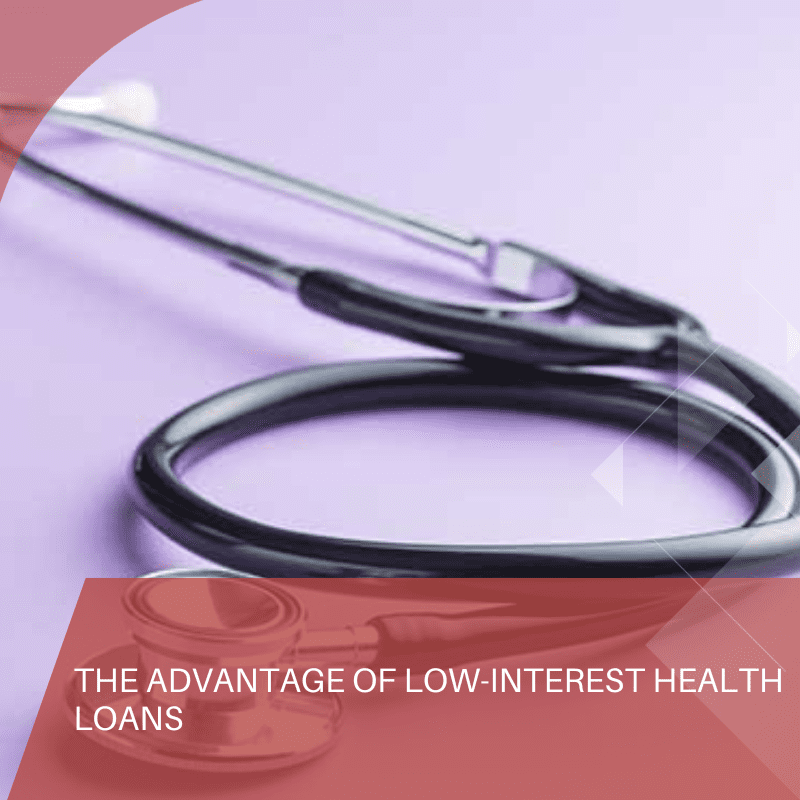Navigating the landscape of healthcare expenses in today’s world can be financially daunting. From unexpected medical crises to routine check-ups, the accumulation of bills can strain one’s resources. In such times, low-interest health loans emerge as a vital support system, offering a lifeline to manage these expenses effectively.
Understanding Low Interest Health Loans
Understanding the Essence of Low-Interest Health Loans Low-interest health loans serve as specialized financial assistance tailored for medical expenditures. They alleviate the burden of payments for doctor visits, hospital bills, and necessary medical procedures, often presenting lower interest rates compared to conventional loans or credit cards.
Financial Flexibility and Cost-Efficiency
Financial Flexibility and Cost-Efficiency The inherent advantage of low-interest health loans lies in the financial flexibility they afford. Medical emergencies can strike at any moment, and these loans provide prompt access to funds, ensuring immediate healthcare without enduring financial constraints. Moreover, their lower interest rates translate into substantial cost savings compared to credit card usage, culminating in reduced overall expenses.
Collateral-Free Assistance Unlike certain loans that necessitate valuable assets as collateral, low-interest health loans typically do not require such security measures. This ensures the safeguarding of personal possessions, eliminating the risk of forfeiture if repayment complications arise.
Stable Payment Structure
Stable Payment Structure and Extended Repayment Periods These loans often feature fixed interest rates, enabling borrowers to anticipate and manage consistent monthly payments. Additionally, they offer extended repayment timelines, alleviating the pressure of immediate reimbursement commonly associated with credit card debts.
Advantages Of Low Interest Health Loans
The Advantages of Low-Interest Health Loans Reducing Financial Stress: Medical bills often induce considerable stress, intertwining concerns about both health and finances. Low-interest health loans mitigate this stress by providing the necessary funds, easing worries associated with medical payments.
Prompt Fund Access: In emergencies, swift access to funds is crucial. Low-interest health loans ensure expedited access, enabling individuals to commence treatment promptly without financial delays.
Potential Credit Score Enhancement: Responsible management of these loans by timely repayments can contribute positively to one’s credit score, enhancing future financial prospects.
Evasion of High Credit Card Expenses: By opting for low-interest health loans over credit cards for medical expenses, individuals avoid exorbitant interest rates, resulting in substantial long-term savings.
Tailored for Healthcare Expenses: Specifically designed for medical costs, these loans encompass various medical needs, encompassing surgeries, routine check-ups, and doctor visits.
Simplified Application Process: The application process for low-interest health loans is usually streamlined, minimizing bureaucratic hurdles and expediting the acquisition of funds for medical necessities.
In Conclusion Low-interest health loans stand as a cornerstone in effectively managing healthcare expenditures. With their capacity to alleviate financial strain, provide quick access to funds, and potentially enhance credit scores, these loans offer a multitude of advantages. For those seeking to safeguard financial stability while prioritizing health, exploring the option of a low-interest health loan proves invaluable.
FAQs:
- Coverage of Medical Expenses: Low-interest health loans typically cover a wide array of medical costs, including surgeries, hospitalization, medications, and dental procedures.
- Interest Rates: The interest rates for these loans vary based on the lender and individual creditworthiness but generally offer lower rates compared to credit cards or personal loans.
- Fund Access Speed: Many lenders facilitate quick approval and disbursement, often within a few days of application.
- Credit Requirements: While a good credit score may secure lower rates, some lenders provide options for individuals with less-than-perfect credit.
- Usage for Non-Urgent Procedures: Low-interest health loans often extend their coverage to both necessary and non-urgent medical procedures, providing flexibility in healthcare choices.

